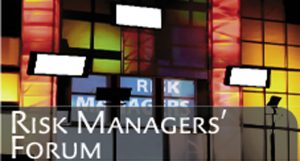RECESSION-PROOF YOUR BUSINESS
USE RISK MANAGEMENT TO RECESSION-PROOF
YOUR BOOK OF BUSINESS
Now is a good time to practice some prevention
By Randy Boss, CRM, MWCA, SHRM-SCP
Business traditionally follows a vicious cycle, with declines in output, employment, and income that feed into further drops that spread rapidly from industry to industry. The general definition of recession—two consecutive quarters of negative gross domestic product (GDP)—indicates that the United States entered a recession in the summer of 2022. I’ve been in the insurance industry for over 40 years, and recall when we were coming out of a recession in 1982, when I needed a larger home for my growing family; mortgage interest rates were 18% … ouch. We had another downturn in 1991 that was mild in comparison to previous contractions. In 2008, lax lending standards and cheap credit fueled a housing bubble that triggered a financial crisis. It brought down investment bank Lehman Brothers, and insurance giant AIG needed to be bailed out.
Some believe we are entering the next recession. If that’s true what can we do as agents to recession-proof our book of business? Having been through these cycles before, we must be aware that a large portion of our revenue is driven by payroll, sales, and employee count. When those go down, our income drops. This often occurs at renewal time, when projections are reduced, and then again during audits when they come in even lower. As a result, your renewal is smaller and now you need to return premium at the audit.
Another thing to consider is that insurance industry market cycles are market-wide fluctuations that vary. A soft market is where there will be increased competition or perhaps depressed premiums; this type of market is usually followed by a hard market—a period of rising premiums and decreased capacity. If you are new to the industry, you only know a soft market. Ask an insurance industry veteran what it is like to do business in a hard market. The answer you get will be that during this time insurers impose strict underwriting standards and issue a limited number of policies. Premiums are high and insurers are disinclined to negotiate terms.
Hard markets can be caused by a number of incidents, including a spike in the frequency or severity of losses by insurance holders. Current pressures are the COVID-19 pandemic, catastrophic storms like Hurricane Ian, the war in the Ukraine, an increase in auto accident fatalities mostly caused by speeding and large settlements by a younger jury pool, just to name a few.
If we are indeed entering a recessionary period, now is a good time to practice some prevention ourselves and recession-proof our book of business.
What to do
Business cycles are like the seasons: spring, summer, fall and winter. When winter comes, we can either bury our heads in the snow or make our own economy by focusing on what we can control, like our attitude and activity.
Forget about what we are losing; focus on our clients and potential clients. Begin to diversify the industries we target. Forget about just selling insurance policies; focus on the relationship with clients, insurance companies, and those we work with. Forget about making a sale; focus instead on creating value and the sales will come. Forget about our challenges and focus on what we are grateful for. Research has shown that gratitude is strongly and consistently associated with greater happiness.
Start with a three-step process of prevention, control, and insurance. Instead of focusing first on quoting insurance, prevent what we can by using checklists and employee risk interviews to discover what can be avoided.
Then, take steps to control costs and disruption should something happen, like helping our clients find a good occupational medicine center to mitigate potential ER-required workplace injuries.
Finally, put in place the proper insurance designed to take care of the unexpected, but also make sure to realize that not all things can be mitigated by insurance, such as the loss of an injured or fatally injured employee and loss of reputation.
Begin with what you can do right now. That means opening more doors to build your pipeline, doing what it takes to retain your clients, and making certain you embrace technology to deliver better results for your clients. Start making yourself better by learning something new about safety, OSHA, HR, and compliance.
As insurance agents, we get rewarded for what we bring to the table. Never stop learning because in this business, you either evolve or dissolve. Be grateful for competition as it only makes us better.
Keep a positive attitude, always be confident, and become a fanatical prospector. Author, salesman, and motivational speaker Zig Ziglar said, “Timid salesmen have skinny kids.”
Develop account retention plans now and don’t wait until your pipeline is empty to start opening new opportunities. Disciplined professionals who execute these fundamentals will keep their clients and outdo their competitors while also taking away their best customers.
The author
Randy Boss is a Certified Risk Manager at Ottawa Kent in Jenison, Michigan. As a risk manager, he designs, builds and implements risk management and insurance plans for middle-market companies in the areas of safety, work comp, human resources, property/casualty and benefits. He has over 40 years’ experience and has been at Ottawa Kent for 40 years. He is the co-founder of emergeapps.com, web apps for insurance agents to share with employers. Randy can be reached at rboss@ottawakent.com.












